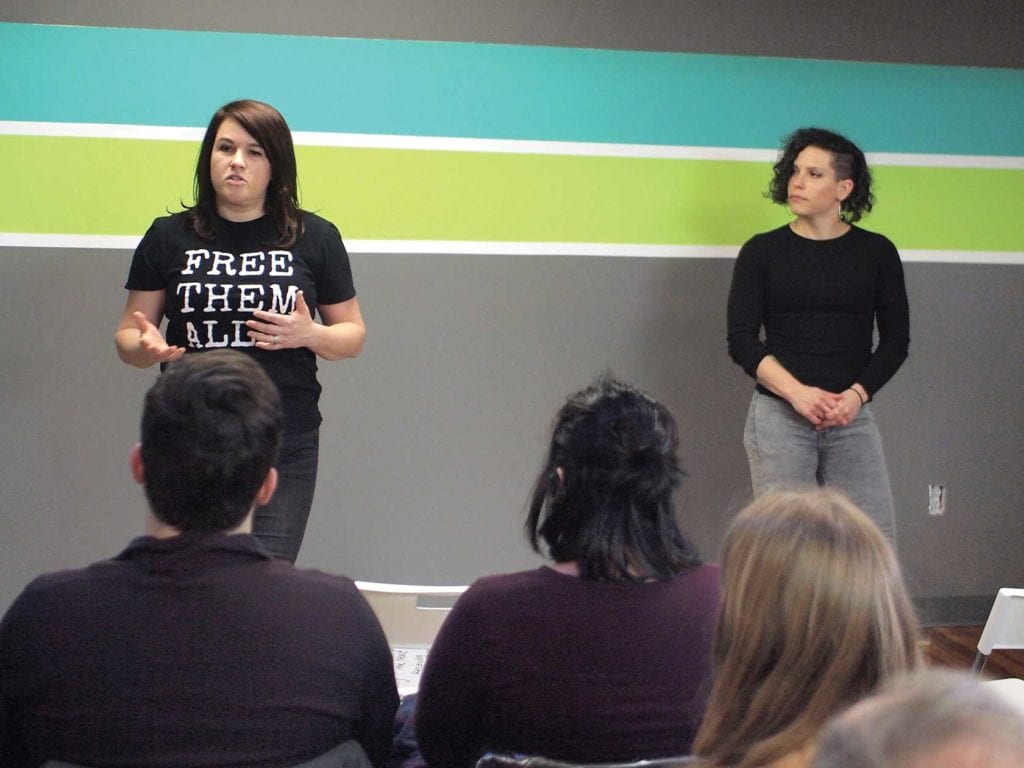Group documents race disparities in Suffolk County courtrooms
CourtWatch MA volunteers collect data on arraignments

The two cases at Boston Municipal Court last week highlighted the differing outcomes for defendants of different races and classes.
In one instance, a black man caught with the opiate suboxone was charged with possession of a class B substance and giving a false name to police. An assistant district attorney asked for $500 bail. The defendant, who admitted being addicted to heroin, did not have the money and was taken to jail.

CourtWatch volunteers have been monitoring Dorchester District Court (above), Roxbury District Court and Boston Municipal court. BANNER PHOTO
In the other, a young white woman was charged with operating under the influence, reckless endangerment, failure to stop for an officer and leaving the scene. She was offered a conditional dismissal of charges with community service.
The cases were documented by a volunteer with the group CourtWatch MA, an volunteer organization that formed last year to monitor the Suffolk County court system.
“When people see what’s happening in our courts, they have a better sense of what needs to change,” said Atara Rich-Shea, one of the group’s organizers.
Rich-Shea and other CourtWatch MA organizers say they were prompted to found the organization by the American Civil Liberty Union’s “What a Difference a DA Makes” campaign, which was aimed at raising awareness of the important role chief prosecutors play in setting and implementing criminal justice policy.
“We wanted to expose what was happening in the courts, and it was an explicitly anti-racist effort,” said organizer Mallory Hanora. “We wanted to have a system for accountability for the people who are making decisions over our neighbors’ lives.”
When Rachael Rollins won the Democratic primary for the Suffolk County district attorney seat last September, all but guaranteeing her election in November, her list of 15 misdemeanor crimes assistant district attorneys would be instructed not to prosecute elicited angry responses from police officials, many of whom earn considerable overtime in court while defendants charged with petty crimes wind their ways through the system.
Among the charges are trespassing, drug possession, driving with a suspended or revoked license, wanton or malicious destruction of property and a minor in possession of alcohol. Rollins argued that such cases are better treated as civil infractions and handled through diversion programs such as drug treatment. Rollins has not yet released her official policy on the misdemeanor crimes. Through a spokesman, she declined to be interviewed for this story.
Hanora and Rich-Shea said the data CourtWatch MA are collecting can serve as a baseline that demonstrates the effectiveness of criminal justice reforms.
During the first four weeks, more than 100 volunteers who underwent training from CourtWatch MA organizers monitored arraignments in Boston Municipal Court, Dorchester District Court and Roxbury District Court, recording information on factors including the charges defendants face, their race and gender, and whether the charges were dismissed and whether or not the defendants were given bail.
The data they collected indicate that 105 cases — 43 percent of the total volunteers observed — were for charges on Rollins’ list of 15 offenses her office would not prosecute without assistant district attorneys receiving permission from a supervisor. Of those 105 cases, 59 percent were declined by prosecutors, while 41 percent were pursued. Additionally, in 25 of those cases, defendants were jailed before arraignment.
In total, 74 individuals were jailed prior to arraignment. Of those, 51 were either released or not prosecuted after being arraigned.
While blacks make up 24 percent of the population in Suffolk County and Latinos make up 22 percent, they accounted for 47 percent and 30 percent of those appearing in court exclusively for charges on Rollins’ decline to prosecute list.
The volunteers who culled the data did not monitor every arraignment in the three court houses under observation, but rather culled a sampling of arraignment sessions. Because Massachusetts courts are not subject to public records laws, the group’s method of sampling represents the only window into the current workings of the system available to the public.
Seeing what appears to be racially disparate treatment being meted out by Suffolk County prosecutors, who are overwhelmingly white, was jarring for Damin Bosetti, a volunteer with CourtWatch MA who last year volunteered for the Rollins campaign and last week observed the black man jailed for lack of $500 in bail money after being charged with class B drug possession and the white woman free on operating under the influence and related violations.
“Intellectually, I knew these disparities existed, but seeing it in real life was, nevertheless, shocking,” he said.
While the white woman came into court with an attorney, the black man arrived in shackles, having spent the night in jail.
Rahsaan Hall, director of the Racial Justice Program of the ACLU of Massachusetts, said prosecutors’ practice of requesting defendants be held on bail, even at amounts of $500 or less, tilts the scales of justice for low-income and indigent defendants.
“It has a disruptive effect on people’s lives,” he said. “For as long as they’re detained, they lose work, they can lose their jobs, they can, in some cases, lose their children. People are more inclined to plead guilty when they’re held on bail.”
Hall said he would like to see Rollins honor her commitment to decline prosecution on cases involving the 15 misdemeanor crimes and make public data on the cases her office is prosecuting.
CourtWatch MA organizer Mallory Hanora said she hopes to see Rollins’ new policy released soon.
“I do believe it takes time to change an institution,” she said. “I know District Attorney Rollins campaigned on this policy. Residents of Suffolk County expect to see this change happen.”






